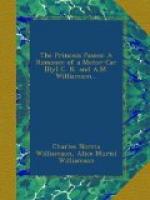I told myself this, somewhat grandiloquently, and with self-gratulation, as I rubbed shoulders with certain of the world’s heroes who had passed along this way; and there was physical relief after a strain, when the precipitous valley widened into billowy pastures lying green at the rugged feet of mountains. Can any sound be more soothing than the tinkle of cow-bells in a mountain pass, as twilight falls softly, like the wings of a brooding bird? It is to the ear what a cool draught of spring water is to thirsty lips. There are verses of poetry in it, only to be reset and rearranged, like pearls fallen from their string; there is a perfume of primroses in it; there is the colour of early dawn, or of fading sunset, when a young moon is rising, curved and white as a baby’s arm; there is also the same voice that speaks from the brook or the river running over rocks.
Suddenly we were in the midst of a great herd of cows, which blew out volumes of clover breath upon us, in mild surprise at our existence. They rubbed against us, or ambled away, lowing to each other, and I was surprised to find that, instead of each neck being provided with a bell, as I had fancied from the multitudinous tinklings, one cow only was thus ornamented.
“How was the selection made?” I asked Joseph. “Did they choose the most popular cow, a sort of stable-yard belle, voted by her companions a fit leader of her set; or was the choice guided by chance?” Joseph could not tell me, and I suppose that I shall never know.
The big, lumbering forms crowded so closely round us in the twilight shadows, that now and then, to force a passage, Joseph was obliged to pull a slowly whisking tail, resembling almost exactly an old-fashioned bell-rope. Presently we had made our way past the herd, which was shut from our sight by the curtain of evening, though up on the mountain-tops it was still golden day.
“There,” said Joseph, pointing, “is the Cantine de Proz.”
[Illustration]
CHAPTER X
The Scraping of Acquaintance
“You shall be treated to
. . . ironical smiles and mockings.”
—WALT
WHITMAN.
“Up the hillside yonder,
through the morning.”
—ROBERT
BROWNING.
I saw, standing desolate in the basin of mountains, an old house of grey stone, very square, very plain, very resolute and staunch of physiognomy. The windows were still unlighted, and it looked a gloomy home for months of winter cold and snow. Suddenly, as we approached, rather wearily now, a yellow gleam flashed out in an upper window.
“That is the spare room for strangers,” said Joseph, and I thought that there was a note of anxiety in his voice.
“Perhaps someone has arrived before us,” I remarked. “I hadn’t thought of that, as you said so few people ever stopped at the Cantine over night.”
“Had you noticed, Monsieur, that after all we never passed the party with the donkeys?” asked my muleteer.




